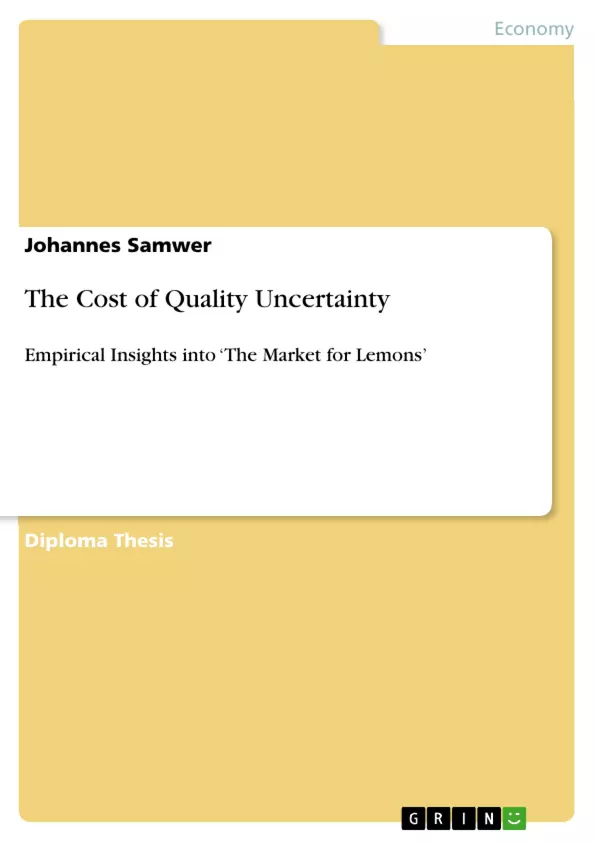This paper relates price with quality uncertainty, proving its persistence in the market for used cars in Germany. Based on 1,712 online car offers, grouped in four different segments, we test three hypotheses regarding the cost of quality uncertainty. A significant price difference between private and professional sellers is statistically confirmed. This price difference remains statistically significant even if private sellers’ prices are adjusted in terms of assuring the same quality as professional sellers. The impact of quality signals is thereby found to be positive, but insufficient to counter quality uncertainty. The evidence suggests that quantifying the cost of quality uncertainty depends largely, but not solely, on the price of the good.
Inhaltsverzeichnis (Table of Contents)
- 1 Introduction
- 2 Theoretical Foundation of and Hypotheses on the Effects of Quality Uncertainty
- 2.1 Roots and Pitfalls of Quality Uncertainty
- 2.1.1 Asymmetric Information
- 2.1.2 Adverse Selection
- 2.2 Counteracting Institutions
- 2.2.1 Governmental Institutions
- 2.2.2 Private Institutions
- 2.3 Behaviour of Market Actors
- 2.3.1 Assumptions
- 2.3.2 Sellers
- 2.3.3 Buyers
- 2.4 Size and Structure of Prices
- 2.4.1 Correlation between Quality and Price
- 2.4.2 Price Components
- 2.1 Roots and Pitfalls of Quality Uncertainty
- 3 Empirical Study
- 3.1 Positioning of present study
- 3.2 Data Basis
- 3.2.1 Data Collection
- 3.2.2 Descriptive Statistics
- 3.3 Data Analysis
- 3.4 Results
- 4 Lessons from “Lemons” – Insights and Implications
- 4.1 The Cost of Quality Uncertainty
- 4.1.1 Relative and Absolute Size
- 4.1.2 Structure
- 4.2 Implications for Market Actors
- 4.2.1 Government
- 4.2.2 Sellers
- 4.2.3 Buyers
- 4.3 Transferability according to main study features
- 4.3.1 Legal Framework
- 4.3.2 Platform
- 4.3.3 Product
- 4.4 Limitations and Avenues for Further Research
- 4.4.1 Limitations
- 4.4.2 Avenues for Further Research
- 4.1 The Cost of Quality Uncertainty
- 5 Summary
Zielsetzung und Themenschwerpunkte (Objectives and Key Themes)
This paper analyzes the impact of quality uncertainty on the market for used cars in Germany. It aims to quantify the cost of quality uncertainty by comparing prices of used cars sold by private and professional sellers, while controlling for the influence of quality signals. The study investigates how quality uncertainty affects market actors, including government, sellers, and buyers, and explores the transferability of its findings to other markets.- The persistence of quality uncertainty in the used car market
- The cost of quality uncertainty to buyers
- The role of quality signals in mitigating quality uncertainty
- The impact of quality uncertainty on market actors
- The implications of the findings for various markets
Zusammenfassung der Kapitel (Chapter Summaries)
- Chapter 1: Introduction This chapter provides a general introduction to the research topic and the context of the study, highlighting the significance of the used car market and the relevance of quality uncertainty in this market.
- Chapter 2: Theoretical Foundation of and Hypotheses on the Effects of Quality Uncertainty This chapter lays out the theoretical framework for understanding quality uncertainty, introducing concepts such as asymmetric information, adverse selection, and the role of institutions in mitigating uncertainty. It then outlines the hypotheses that will be tested in the empirical study.
- Chapter 3: Empirical Study This chapter delves into the methodology and results of the empirical study, including details on the data collection process, the chosen dataset of used car offers, and the descriptive statistics of the data. It also discusses the data analysis techniques employed and presents the findings of the study.
- Chapter 4: Lessons from “Lemons” – Insights and Implications This chapter discusses the key insights and implications derived from the empirical study. It analyzes the cost of quality uncertainty, exploring both its relative and absolute size, and examining its structure. The chapter further examines the implications of the findings for different market actors, such as government, sellers, and buyers. It concludes by discussing the transferability of the study's findings to other markets, highlighting its limitations and avenues for further research.
Schlüsselwörter (Keywords)
The paper focuses on the "lemons problem" and its implications for the market for used cars in Germany. Key topics include asymmetric information, adverse selection, quality uncertainty, price premiums, market signals, and the impact on market actors. The study also discusses the role of government regulation and the relevance of its findings for other markets.Frequently Asked Questions
What is the "Lemons Problem" in the used car market?
The lemons problem refers to quality uncertainty caused by asymmetric information, where sellers know more about a car's quality than buyers, potentially leading to adverse selection.
Is there a price difference between private and professional car sellers?
Yes, the study confirms a significant price difference. Professional sellers generally charge more, partly due to the lower quality uncertainty and warranties they provide.
Do quality signals help reduce price uncertainty?
Quality signals (like service history or certificates) have a positive impact on price, but they are often insufficient to completely counter quality uncertainty for private sellers.
What are the pitfalls of asymmetric information?
Asymmetric information can lead to market failure where high-quality goods are driven out because buyers are unwilling to pay a premium without quality assurance.
How can buyers mitigate the cost of quality uncertainty?
Buyers can rely on private institutions, professional inspections, and looking for strong quality signals, though these often come at an additional cost.
- Citar trabajo
- Johannes Samwer (Autor), 2006, The Cost of Quality Uncertainty, Múnich, GRIN Verlag, https://www.grin.com/document/143377



